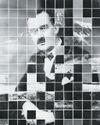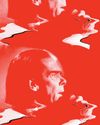
In music and on roller coasters, speediness makes for the fun kind of scariness. When young punk rockers raised on the Ramones began to play their own music in the early 1980s, the rat-a-tat rumble of “Blitzkrieg Bop” accelerated into something called the blast beat: an all-out rhythmic carpet-bombing over which vocalists would groan about Satan, Ronald Reagan, and the resemblance between the two. This development pushed rock and roll’s intrinsic logic—through dissonance, truth; in disaffection, pride—and invigorated new genres such as hardcore, grindcore, and death metal. In a 2016 book, the critic Ben Ratliff argued that blast beats also reflected a new technological landscape: “They were like the sound of a defective or damaged compact disc in one of the early players, a bodiless slice of digital information on jammed repeat.”
Today, no drum kit is required for musicians to glitch and twitch with terrifying intensity. Open up any audio-editing software, pull a few sliders in one direction, put the resulting ugliness on loop, and there you have it: a headbangable hell-scream into eternity. Such sounds are everywhere online these days. On TikTok, I recently came across a series of videos in which teens compared how their parents wanted them to dress with how they actually wanted to dress. As preppy sweaters gave way to nose rings and black fishnets, the music flipped from a saccharine sing-along to a harsh digital pounding. The latter sound was like a car alarm outfitted with a subwoofer—but for some reason, it beckoned to be played louder, rather than to be shut off.
この記事は The Atlantic の March 2021 版に掲載されています。
7 日間の Magzter GOLD 無料トライアルを開始して、何千もの厳選されたプレミアム ストーリー、9,000 以上の雑誌や新聞にアクセスしてください。
すでに購読者です ? サインイン
この記事は The Atlantic の March 2021 版に掲載されています。
7 日間の Magzter GOLD 無料トライアルを開始して、何千もの厳選されたプレミアム ストーリー、9,000 以上の雑誌や新聞にアクセスしてください。
すでに購読者です? サインイン

The Dark Origins of Impressionism
How the violence and deprivation of war inspired light-filled masterpieces

The Magic Mountain Saved My Life
When I was young and adrift, Thomas Manns novel gave me a sense of purpose. Today, its vision is startlingly relevant.

The Weirdest Hit in History
How Handel's Messiah became Western music's first classic

Culture Critics
Nick Cave Wants to Be Good \"I was just a nasty little guy.\"

ONE FOR THE ROAD
What I ate growing up with the Grateful Dead

Teaching Lucy
She was a superstar of American education. Then she was blamed for the country's literacy crisis. Can Lucy Calkins reclaim her good name?

A BOXER ON DEATH ROW
Iwao Hakamada spent an unprecedented five decades awaiting execution. Each day he woke up unsure whether it would be his last.

HOW THE IVY LEAGUE BROKE AMERICA
THE MERITOCRACY ISN'T WORKING. WE NEED SOMETHING NEW.

Against Type
How Jimmy O Yang became a main character

DISPATCHES
HOW TO BUILD A PALESTINIAN STATE There's still a way.